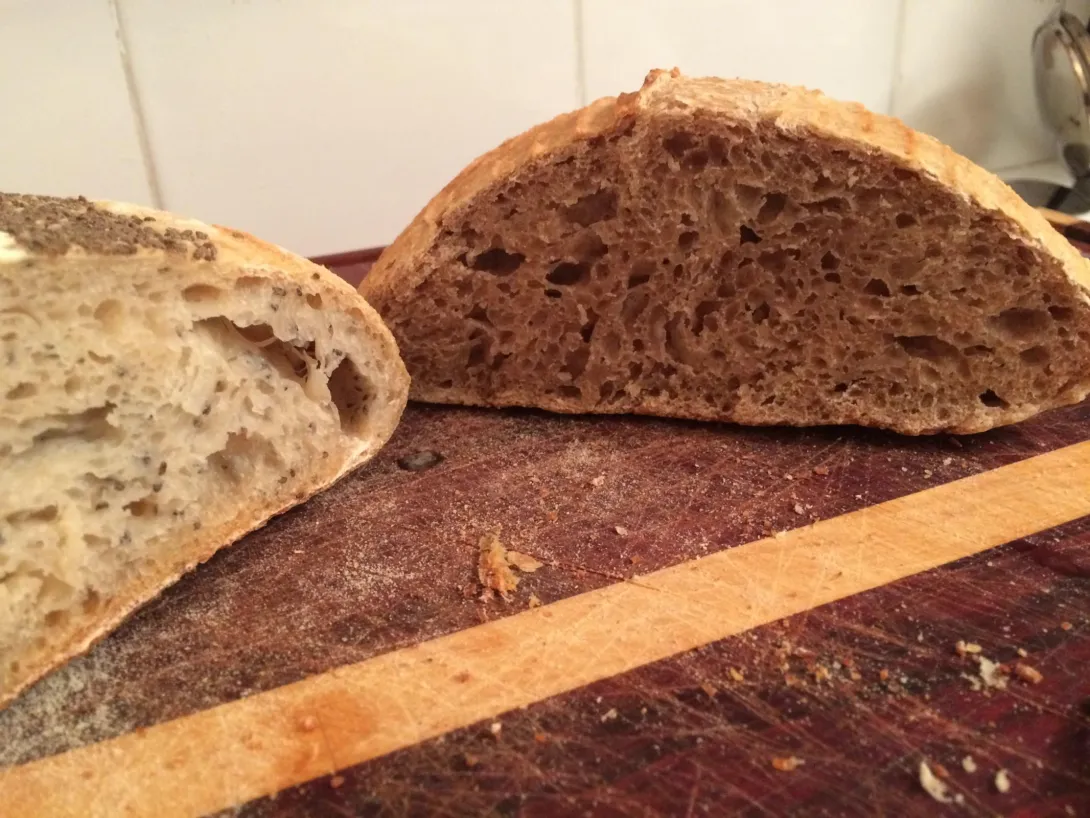
Last weekend I baked my two first attempts of making a bread (sourdough) without following a recipe. I mean I adapted the recipe I've being following, and gone handling it much more by feeling than by times and temperatures.
I made two different doughs, both with 70% hydration. One all white, the other 60% whole wheat.
Both worked well.
The whole loaf has a soft crumb a nice crust but not such a big holes. Tasted good, a little bitter...
The white was delicious, but the dough had a little difficulty holding it's shape when transferred from the banneton. And they have being proofed in the fridge over night. Was not a disaster, the loaf spread soon, no ears, but some reasonable oven spring.
So I'm wondering...
I know the whole wheat absorbs more water, and 70% hydration is not as much for a whole loaf as it is for a white one.
The whole loafs did hold their shapes much better than the white ones.
The "fix" for this is only reducing the water amount, or is there anything I can make to improve the dough structure besides less hydration? Like more SaFs, less proofing? Or anything else?
The basic procedure and numbers was:
100% flour
70% h2O
0.02% salt
----
25% in a poolish 12hrs
mix/autolyse/knead until window pane
2 SaF at +- 1hr interval
1hr more of bulk
pre shape/shape
proof in fridge over night.
Actually, they both look quite lovely! Well done. You might try more stretch & folds at shorter intervals for the white dough (say, every half hour for the first 2 hours).
And just to note - to counter the slight bitterness of the whole wheat bread many bakers add a bit of honey or other sweetener and oil (coconut oil is nice).
Thanks Lazy Loafer. I'l try more SaF as you suggested. Thanks for the "lovely" also.
:)
Good note on bitterness. Beside sweeteners, are there others techniques to deal with WW bitterness. I've read that WW flour has a shorter shelf life because of the oil contained. I found an organic WW flour that I hope will be fresher, but the pack I used on this batch was already stored for some time. The new ones I did stored on freezer, let's see how it turns out in the next batch. But I also read somewhere that longer fermentation would reduce bitterness. Any thoughts on that?
Thanks
vk
I'm not sure about the longer ferment times reducing bitterness, but what I do for some of my breads (learned this from this forum) is to sift the WW flour and use the sifted bits in the starter, then use the sifted flour in the final dough. It also depends what kind of WW flour you have. One of the commercial WW flours I use is obviously sifted milled flour with a lot of bran added back in. The bran is probably the most bitter part. If I mill my own WW flour and then sift it I get much different bits than that! Try sifting and see what you get, and then ferment that part in the starter.
I bought this organic flour and used to complete a recipe throwing it over the an industrial one I had, comparing it with the other, industrial one, I could see that it is, for sure, a different thing. Lets see how it goes. We have no easy flour options up here.
thanks
:)
What kind of seeds are those on the white loaf? They kind of look like celery seeds.
--Mike
Hi Mike. Sorry, I didn't mention the seeds. I decided to add them later. I made dough for two white and two whole loafs. Then I split the white dough and added the chia to one bread. As an experiment. It turned out great! The seed is very bland, with a discrete nut flavour. It's said to be a marvellous food when it comes to nutrition. Like a super food :)
It's also a curious grain. It can absorb 12 times its mass in water, and when mixed with water, it makes a wonderful jelly mess. I soaked in 4 time its weigh. The water was immediately absorbed and the hole stuff becomes a jelly mess.
I end up adding about 1.3% in final dough, plus some in the outside. Will repeat for sure.
vk